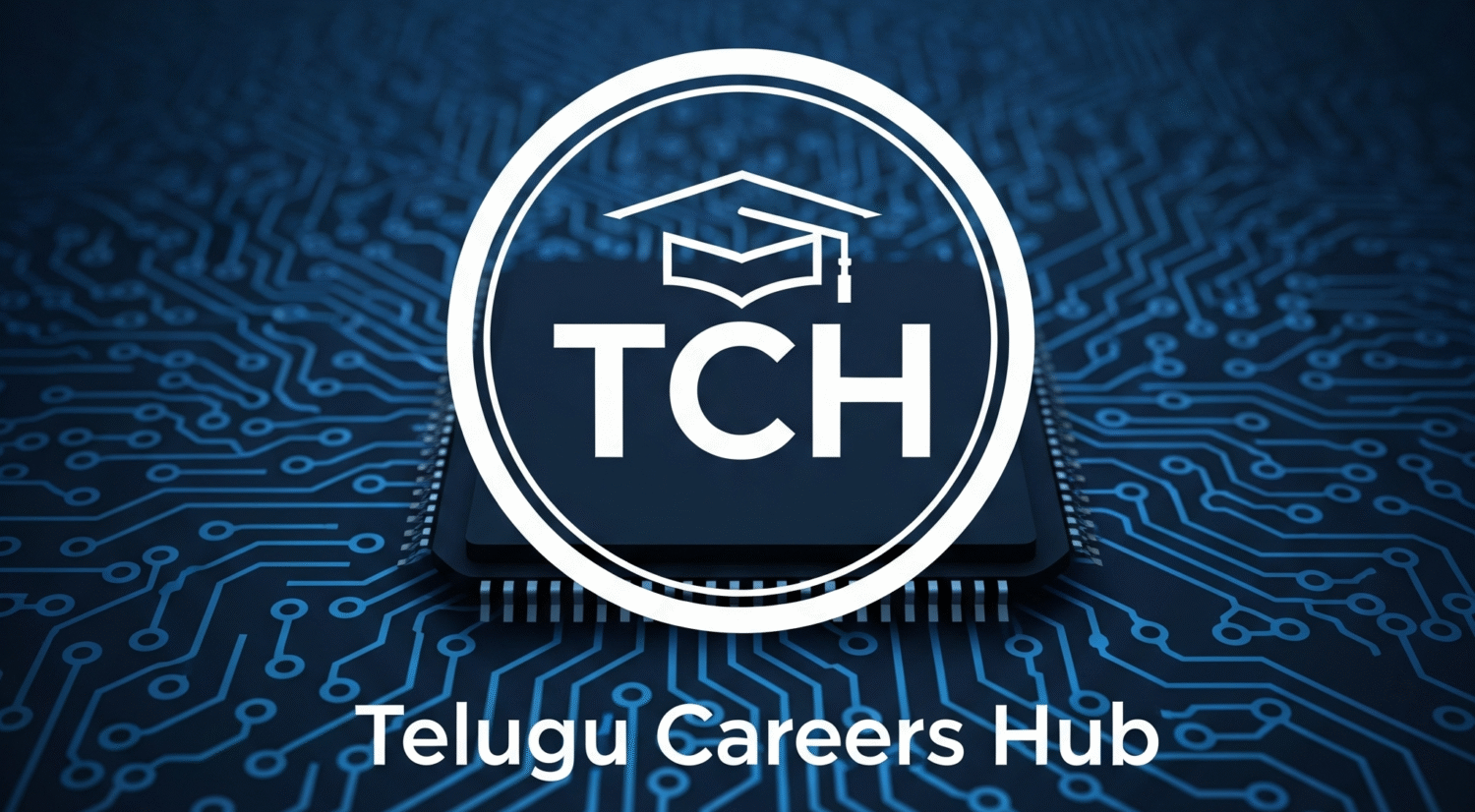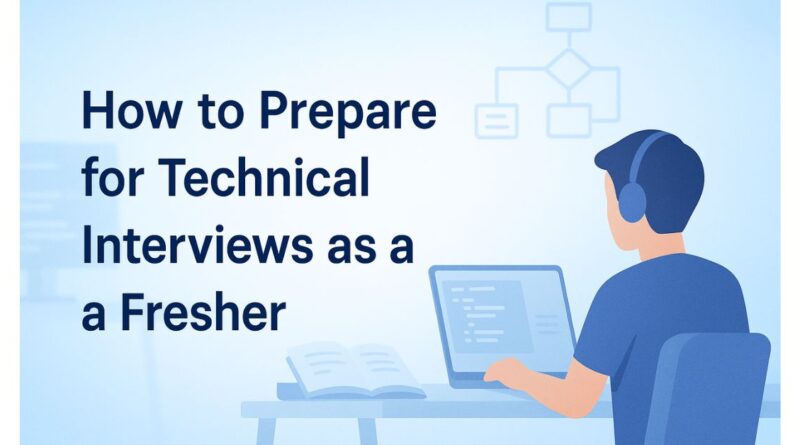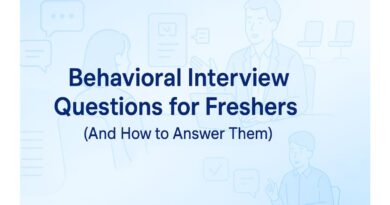How to Prepare for Technical Interviews as a Fresher: The Ultimate Step-by-Step Guide
How to Prepare for Technical Interviews as a Fresher: The Ultimate Step-by-Step Guide
Entering the IT industry as a fresher is both thrilling and intimidating. You bring enthusiasm, curiosity, and raw talent to the table—but you’re also stepping into a competitive field where your skills will be rigorously tested. One of the first major challenges is cracking the technical interview. These interviews are designed to assess your coding abilities, computer science fundamentals, and your approach to solving real-world problems under pressure.
This comprehensive, 3000+ word guide walks you through each step of technical interview preparation tailored specifically for freshers. From mastering DSA and system design to refining your resume and soft skills, every aspect is covered. Let’s dive deep.
🗺️ Section 1: Understand the Technical Interview Process for Fresher
Before you start preparing, you need to understand what you’re preparing for. The technical interview process for fresh graduates usually follows a predictable structure, although it can vary slightly depending on the company and role.
Typical Interview Rounds:
- Online Assessment (OA):
- Often your first filter.
- Contains multiple-choice questions (MCQs) and coding problems.
- Timed and proctored to simulate a real testing environment.
- Technical Rounds:
- Usually 1–2 rounds with a software engineer or tech lead.
- Focuses on Data Structures, Algorithms, and language-specific questions.
- Problem-solving on a shared code editor.
- Project Discussion Round:
- I’d like to point out that detailed discussion around your resume projects.
- Expect questions on architecture, technology choices, challenges, and your specific contributions.
- System Design (For select roles):
- Entry-level problems, like designing a library management system or chat application.
- Tests your ability to think in terms of systems, scalability, and modularity.
- HR / Behavioral Round:
- Tests cultural fit and communication skills.
- Common questions include your strengths, weaknesses, goals, and team experiences.
Why Understanding This Matters:
- Helps you tailor your preparation smartly.
- Prevents wasting effort on irrelevant topics.
- Reduces interview-day anxiety since you’ll know what to expect.
🧠 Section 2: Data Structures & Algorithms – Your Core Weapon for Fresher
If there’s one area that’s non-negotiable for a fresher, it’s DSA. Interviewers use it to assess how well you can handle problems you’ve never seen before, under time pressure.
Must-Learn Topics:
- Arrays & Strings:
- Techniques: Sliding window, two pointers.
- Problems: Longest substring without repeating characters, maximum subarray.
- Linked Lists:
- Reversal, merging, detecting cycles (Floyd’s algorithm).
- Stacks & Queues:
- Use cases: Balancing symbols, evaluating postfix expressions.
- HashMaps & HashSets:
- Frequency counting, checking for duplicates, and grouping anagrams.
- Recursion & Backtracking:
- Classic problems: Sudoku solver, N-Queens.
- Binary Trees & BSTs:
- Traversals (inorder, preorder, postorder), diameter, height.
- Graphs:
- Representations: Adjacency list/matrix.
- Algorithms: DFS, BFS, Dijkstra, topological sort.
- Sorting & Searching:
- Merge sort, quick sort, and binary search on sorted arrays.
- Dynamic Programming:
- Topics: Memoization, tabulation.
- Problems: Knapsack, Longest Increasing Subsequence, and coin change.
Practice Platforms:
- LeetCode: Premium problems from real interviews.
- GeeksforGeeks: Theoretical explanations plus coding problems.
- InterviewBit: Structured levels, suitable for beginners.
- NeetCode.io: Clean UI and curated 75 problem list.
Strategy:
- Dedicate 2–3 months.
- Follow a consistent pattern: read theory → solve easy → medium → hard.
- Maintain a journal or GitHub repo of solved problems with explanations.
💻 Section 3: Choose One Programming Language and Master It for Fresher
One of the most common mistakes freshers make is trying to learn multiple programming languages at once. While versatility is valuable, your goal during technical interviews should be depth, not breadth. Mastering one language allows you to focus on solving problems efficiently rather than battling syntax errors or unfamiliar APIs.
Why Choose Just One Language?
- Consistency: Using the same language across your projects, coding problems, and system designs keeps your learning curve smooth.
- Speed: During interviews, especially timed online rounds, familiarity with your primary language helps you code faster.
- Depth Over Breadth: You gain a much deeper understanding of concepts like memory management, OOP, and recursion when you stick with one language.
How to Choose the Right Language
There is no universal “best” language. Your choice should be based on the type of companies you’re targeting, your academic exposure, and your comfort level.
Python:
- Pros: Simple syntax, concise code, powerful libraries like NumPy and Pandas, ideal for beginners and rapid development.
- Best for: Startups, AI/ML roles, data science, general coding rounds.
- Learning Curve: Very beginner-friendly.
Java:
- Pros: Object-oriented, widely used in large enterprises, extensive documentation, solid standard libraries.
- Best for: Product-based companies like Amazon, Infosys, TCS; Android development.
- Learning Curve: Moderate; boilerplate code can be verbose but structured.
C++:
- Pros: Fast execution, direct memory management, powerful STL (Standard Template Library).
- Best for: Competitive programming, algorithm-heavy roles, game development.
- Learning Curve: Steeper than Java/Python due to syntax complexity.
JavaScript:
- Pros: Ubiquitous in web development, integrates easily with front-end frameworks, event-driven programming model.
- Best for: Front-end and full-stack developer roles, UI/UX-oriented projects.
- Learning Curve: Easy to pick up, tricky quirks in behavior (e.g., asynchronous code).
Core Areas to Master in Your Chosen Language
Regardless of which language you pick, there are some must-know areas that you should cover to be truly interview-ready:
1. Language Fundamentals
- Data types, variables, conditionals, loops
- Functions (parameters, return values, scope)
- Input/output operations
- Exception handling
- Modules and libraries
2. Object-Oriented Programming (OOP)
- Classes and objects
- Encapsulation, abstraction, inheritance, and polymorphism
- Interfaces and abstract classes
- Use of design patterns (like Singleton, Factory, etc.)
3. Built-in Data Structures
- Arrays, lists, dictionaries/maps, sets, queues, stacks
- Know how to use these efficiently and when to apply which one
- Time complexity of operations (insertion, deletion, search)
4. File Handling and I/O
- Reading and writing files (text, JSON, CSV)
- Handling streams and buffers (especially in Java, C++)
5. Recursion and Functional Programming
- Writing recursive functions (base case, recursive step)
- Using built-in functions like
map,filter,reducein Python/JavaScript
6. Libraries and Frameworks (Optional but Nice to Have)
- Python: NumPy, pandas, requests
- JavaScript: Axios, Lodash
- Java: Apache Commons, JUnit (for testing)
- C++: STL (vectors, maps, stacks, queues)
Tips to Master a Language Effectively
- Build Mini Projects: Apply your knowledge to small applications like calculators, to-do apps, or portfolio websites.
- Read Documentation: Especially for standard libraries and data structures.
- Join Language-Specific Communities: Reddit (e.g., r/learnpython), Stack Overflow, GitHub discussions.
- Debug Often: Use IDEs like VS Code, IntelliJ, or PyCharm to practice debugging your code.
- Pair Programming: Solve problems with a peer using only one language. It reinforces habits and syntax.
Interviewer’s Perspective
Interviewers aren’t typically concerned with which language you use, as long as:
- You write clear, correct, and optimal code
- You use appropriate data structures
- You can explain your logic and debug your mistakes
Final Thoughts on Language Mastery
Think of your programming language as your sword. It doesn’t matter whether it’s sharp or flashy—what matters is how well you can wield it. Pick one, sharpen it relentlessly, and let it become second nature to you. Whether you’re solving DSA problems, building REST APIs, or explaining a recursive solution to an interviewer, your fluency in that language will be your greatest ally.
🎯 Section 4: Learn Problem-Solving Techniques and Patterns for Fresher
Rather than memorizing hundreds of questions, learn the patterns and strategies that underpin them.
Core Problem-Solving Techniques:
- Sliding Window: Efficiently handle subarray or substring problems.
- Two Pointers: Optimize sorted array/list traversal.
- Binary Search: Powerful for searching, even in non-traditional formats (rotated arrays).
- Greedy: Locally optimal decisions that lead to a globally optimal solution.
- Backtracking: Explore all possibilities recursively.
- Recursion to DP: Learn to recognize overlapping subproblems.
How to Master Them:
- Do 2–3 problems per pattern.
- Use a spaced repetition notebook or flashcards.
- Build templates and refine them as you go.
🛠️ Section 5: Build Real, Deployable Projects for Fresher
Projects are the backbone of your resume. They show initiative, applied knowledge, and creativity.
Project Ideas:
- Portfolio Website: Personal profile with GitHub, blogs, contact info.
- E-commerce Clone: Basic inventory, cart, checkout, and admin panel.
- Expense Tracker: Use Firebase or SQLite for storage.
- Weather App: Fetch data using OpenWeatherMap API.
- Blog Platform: Full CRUD features, Markdown editor.
Tips for Projects:
- Use Version Control: GitHub is non-negotiable.
- Write README files: Explain purpose, tech stack, and how to run the project.
- Deploy Live: Use platforms like Vercel, Netlify, or Heroku.
- Test Your Code: Add unit tests or simple test cases.
These become talking points in interviews and highlight practical coding ability.
🧠 Section 6: Brush Up on CS Fundamentals for Fresher
While data structures and algorithms are at the core of technical interviews, your understanding of computer science fundamentals can be a major differentiator—especially in the deeper technical rounds. Interviewers often ask CS theory questions to test whether a candidate has a strong academic foundation and can apply theoretical knowledge to real-world problems.
Many freshers underestimate this section, focusing solely on DSA. However, solid grasp of Operating Systems, DBMS, OOP, and Networking can elevate your candidacy and prepare you for broader roles.
Why CS Fundamentals Matter
- Deeper Understanding: Helps you answer system-level questions with confidence.
- Role Relevance: System design, backend roles, and software engineering interviews often include CS concepts.
- Company Preference: Tech giants and product-based companies like Google, Amazon, Microsoft, and Flipkart frequently ask CS theory questions.
- Academic Validation: Validates your education and shows you’ve paid attention beyond just coding.
📘 Key Computer Science Subjects to Review
1. Operating Systems (OS)
Topics to cover:
- Process vs Thread: Understand their lifecycle, advantages, and resource management.
- CPU Scheduling Algorithms: FCFS, SJF, Round Robin, Priority Scheduling.
- Deadlocks: Conditions for occurrence, prevention, and detection.
- Memory Management: Paging, segmentation, virtual memory.
- Context Switching: How CPU shifts between tasks.
Example Questions:
- What is the difference between a process and a thread?
- How does Round Robin scheduling work?
- Explain virtual memory with an example.
Recommended Resources:
- Galvin’s Operating Systems book
- Gate Smashers YouTube channel
- GeeksforGeeks OS section
2. Database Management Systems (DBMS)
Topics to cover:
- Relational Databases and SQL: CRUD operations, primary vs foreign keys.
- Normalization: 1NF, 2NF, 3NF, BCNF.
- Transactions: ACID properties, isolation levels.
- Indexing: B-Trees, hash indexes.
- Joins: Inner, Left, Right, Full, Self Joins.
Example Questions:
- Explain the difference between WHERE and HAVING clauses.
- What are the ACID properties?
- How does indexing improve query performance?
Recommended Resources:
- DBMS by Ramez Elmasri (Book)
- SQLZoo, LeetCode (for SQL practice)
- Stanford Database Course (YouTube)
3. Object-Oriented Programming (OOP)
Topics to cover:
- Four Pillars: Encapsulation, Abstraction, Inheritance, Polymorphism.
- Design Principles: SOLID principles.
- Interfaces and Abstract Classes.
- Real-world modeling: How OOP helps structure applications.
Example Questions:
- Explain inheritance with an example.
- What is polymorphism, and how is it implemented?
- Difference between abstract class and interface?
Recommended Resources:
- JavaTPoint or GeeksforGeeks OOP concepts
- Head First Java (for Java learners)
- YouTube: OOP by Programming with Mosh
4. Computer Networks (CN)
Topics to cover:
- OSI and TCP/IP Models: Understand all layers and their functions.
- IP Addressing: IPv4 vs IPv6, Subnetting basics.
- DNS: What happens when you type a URL.
- HTTP Protocol: Status codes, GET vs POST, HTTPS.
- TCP vs UDP: Use cases, differences in reliability and speed.
Example Questions:
- What is the difference between TCP and UDP?
- How does DNS work?
- Explain each layer in the OSI model.
Recommended Resources:
- Computer Networking by Kurose and Ross (Book)
- Cisco Packet Tracer (for hands-on practice)
- Networking videos by Neso Academy
🎯 Tips to Effectively Study CS Fundamentals for Fresher
- Spaced Repetition: Use flashcards (like Anki) to retain technical definitions and formulas.
- Draw Diagrams: Visualizing concepts like process states or network models helps retention.
- Summarize Each Topic: After reading, explain the topic in your own words to reinforce understanding.
- Watch Conceptual Videos: Use YouTube to break down tough subjects.
- Mix with Coding: Try solving SQL problems on LeetCode or system-oriented problems on HackerRank.
📚 Suggested Weekly Plan for CS Fundamentals for Fresher
If you’re time-boxing your prep, here’s how you might rotate CS topics each week:
- Monday: Operating Systems (focus on CPU scheduling, memory management)
- Tuesday: DBMS (ACID, normalization, joins)
- Wednesday: OOP concepts (real-life examples, implement in code)
- Thursday: Computer Networks (OSI model, HTTP/HTTPS)
- Friday: Practice SQL queries, revisit tough topics
- Weekend: Solve mixed quiz sets + Review handwritten notes
🧩 Final Thoughts on CS Fundamentals
Don’t treat this section as secondary. Strong fundamentals help you:
- Tackle edge-case interview questions
- Communicate clearly and confidently during discussions
- Demonstrate that you’re not just a coder, but a well-rounded computer science graduate
Having a strong grasp of these subjects can give you an advantage over candidates who only focus on coding. It reflects maturity, preparation, and a solid understanding of how software actually runs and interacts with systems.
The bonus? These concepts are not just for interviews. They’ll help you throughout your software engineering career. Take them seriously and your future self will thank you.
💬 Section 7: Practice Mock Interviews and Behavioral Rounds for Fresher
Many candidates falter not on logic, but on communication.
Behavioral Round Prep:
Use the STAR method:
- Situation: Set the context.
- Task: What was your responsibility?
- Action: What did you do?
- Result: What was the outcome?
Common Questions:
- Tell me about yourself.
- Describe a project you’re proud of.
- What’s your biggest challenge so far?
- Why should we hire you?
Where to Practice:
- Pramp.com: Peer-to-peer mock interviews.
- Interviewing.io: Anonymous, real-time mock sessions.
- Peers/Study groups: Schedule weekly mock rounds.
Communication Tips:
- Always explain your thought process.
- Don’t be afraid to ask clarifying questions.
- If stuck, verbalize what you do understand.
📝 Section 8: Build an Interview-Ready Resume for Fresher
Your resume should convey skills, experience, and potential at a glance.
Do’s:
- One page, concise and structured.
- Bullet points with action verbs and metrics.
- Highlight projects, internships, achievements.
- Include GitHub, LinkedIn, and portfolio links.
Don’ts:
- Avoid fluff: No need to mention high school.
- Don’t lie—your interview will reveal the truth.
- No big paragraphs—readability is key.
Pro Tip:
Tailor your resume slightly for each company by highlighting different skills or keywords.
🌐 Section 9: Create a Strong LinkedIn and GitHub Presence for Fresher
Recruiters check your digital footprint.
LinkedIn Checklist:
- Updated profile photo.
- 3–4 line summary.
- List of projects, internships, and achievements.
- Skill endorsements from peers.
- Regular activity: Engage, comment, or share posts.
GitHub Tips:
- Keep repos well-structured.
- Write good commit messages.
- Contribute to open-source or clone real-world apps.
- Pin your best work to the top of your profile.
This shows that you are serious, consistent, and visible.
⏱️ Section 10: Make a Time-Boxed Interview Preparation Plan for Fresher
Effective preparation isn’t just about putting in the hours—it’s about using those hours wisely. Many freshers fall into the trap of either over-preparing a single topic or jumping from one topic to another without a plan. The solution? Time-boxing your preparation with a structured and realistic plan.
What Is Time-Boxing?
Time-boxing is a productivity technique where you allocate a fixed unit of time to each task. Instead of saying “I’ll study DSA today,” you specify “I’ll study sorting algorithms from 10:00 AM to 11:30 AM.” It brings clarity, prevents burnout, and ensures a balanced approach to preparation.
Time-boxing helps you:
- Set daily and weekly goals
- Avoid spending too much time on a single subject
- Track your progress and stay motivated
- Ensure comprehensive preparation across all required domains
Benefits of a Time-Boxed Plan:
- Structure: Avoids the randomness of topic-hopping
- Focus: Encourages deep work in small intervals
- Clarity: You know what to study and when
- Balance: Ensures you don’t neglect key areas like soft skills or CS fundamentals
Sample 8-Week Plan for Interview Preparation
This is a general-purpose plan designed for freshers. You can adjust it depending on your schedule (full-time student vs job-seeker) and prior experience.
Weeks 1–2: Get Started with DSA and a Mini Project
- Focus: Arrays, Strings, and Linked Lists
- Tools: LeetCode (easy problems), GeeksforGeeks (theory)
- Begin a small web or CLI project (e.g., a calculator or portfolio site)
- Start building GitHub and LinkedIn profiles
- Hours/day: 2–3
3–4: Deep Dive into Medium-Level DSA and CS Fundamentals
- Focus: Recursion, Stacks, Queues, HashMaps, Sorting
- CS Subjects: DBMS basics (ACID, normalization, joins), OS basics (process/thread, scheduling)
- Enhance your project with features like login or persistent storage
- Update GitHub with documentation and commits
5–6: Master Advanced DSA + Resume Polish + Start Mocks
- Focus: Trees, Graphs, Dynamic Programming, Backtracking
- CS: OOP, Networking (HTTP, OSI model)
- Finalize your resume and tailor it to roles
- Begin behavioral prep (STAR method)
- Schedule your first mock interviews
7–8: Company-Specific Preparation + Revision + Mocks
- Focus: Revisit past questions from target companies (LeetCode, InterviewBit)
- Review weak DSA topics and CS subjects
- Full-length mock interviews (technical + HR)
- Final polish of GitHub projects and LinkedIn
Daily Routine Example (for Students or Full-time Job Seekers)
Here’s a sample daily routine broken down into time-boxed slots:
Morning:
- 1 hour: DSA problems (solve 1 easy + 1 medium problem)
- 30 minutes: CS Fundamentals (rotate OS, DBMS, CN, OOP)
Afternoon:
- 1 hour: Work on your project (coding, testing, UI)
- 30 minutes: Resume tweak or GitHub activity (add a README, document a function)
Evening:
- 30 minutes: Mock interview prep (behavioral questions, whiteboard coding)
- 15–20 minutes: Reflect on the day, note mistakes, plan for tomorrow
Weekly Tasks Checklist:
- ✅ Solve 10–12 DSA problems
- ✅ Watch 2–3 tutorial videos (OS, DBMS, OOP, CN)
- ✅ Update your GitHub at least twice
- ✅ Add 1 new feature to a project
- ✅ Complete 1 mock interview
- ✅ Revise core resume points
Tools to Support Your Plan:
- Notion/Trello: Task management and tracking
- Google Sheets: Create a progress tracker for DSA topics and CS fundamentals
- Pomofocus.io: For Pomodoro-based time-boxing (25 min focused, 5 min break)
- Calendar Reminders: Block off daily prep hours to build routine
Common Pitfalls to Avoid:
- ❌ Cramming before interviews
- ❌ Ignoring behavioral and HR preparation
- ❌ Focusing only on projects and ignoring problem-solving
- ❌ Jumping into hard DSA before grasping basics
Final Thoughts on Time-Boxing
Time-boxing doesn’t mean over-scheduling or pressuring yourself—it means providing your mind with a reliable routine and focus. Even if you can dedicate just 2 hours a day, with consistency and smart planning, you will build a powerful momentum that compounds over time.
Stick to your schedule, track your growth, and don’t be afraid to pivot if something isn’t working. A good plan is flexible, structured, and action-driven.
Your preparation journey isn’t a sprint. With a clear roadmap and time-boxed plan, you’ll reach the finish line with confidence—and a job offer in hand.
🔑 Section 11: Bonus Tips to Crack the Interview
Do’s:
- Revise questions from previous interviews (Glassdoor, LeetCode Discuss).
- Be honest in interviews—admit when you don’t know something.
- Ask questions to the interviewer—shows curiosity.
- Practice with a whiteboard or pen and paper occasionally.
Don’ts:
- Don’t memorize solutions—aim to understand.
- Don’t get stuck in tutorial hell.
- Don’t neglect HR rounds.
Final Thoughts: Your Success Formula as a Fresher
The leap from student to software engineer is a formidable one, but also deeply rewarding. The key isn’t perfection—it’s persistence.
With a structured roadmap, consistent practice, and confidence in your skills, you can absolutely crack your first technical interview. Start now. Stay focused. Iterate often. And trust the process.
Your dream job is waiting.
Follow us for more Updates: Telugu Careers Hub




